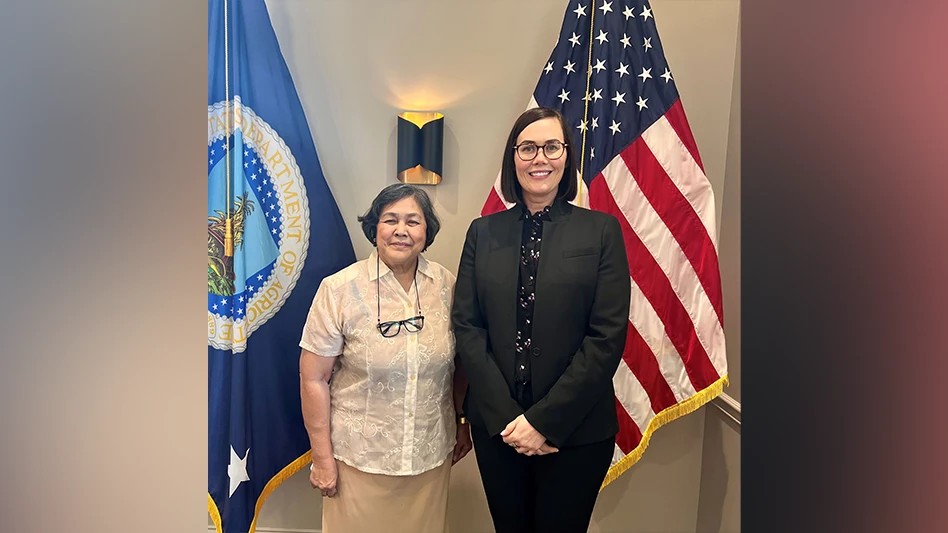
USDA
WASHINGTON, D.C. — The U.S. Department of Agriculture (USDA) today hosted a high-level Food Security Dialogue with the Philippines Department of Agriculture that showcased critical bilateral efforts to address global food security and climate change.
USDA Under Secretary for Trade and Foreign Agricultural Affairs Alexis M. Taylor and Philippines Department of Agriculture Under Secretary for Policy, Planning, and Regulations Mercedita Sombilla chaired an interagency meeting with representatives from the U.S. State Department and the U.S. Agency for International Development (USAID). The dialogue highlighted partnerships and programming that support food security in the Philippines and promote international endeavors to reduce the impact of climate change.
Under Secretary Taylor unveiled two new efforts to further U.S.-Philippine cooperation:
- USDA’s Foreign Agricultural Service will launch a new Faculty Exchange Program between leading U.S. and Philippine universities to advance collaboration on veterinary sciences, which includes addressing sanitary and phytosanitary (SPS) issues and technical barriers to trade.
- The U.S. Department of Commerce is co-sponsoring an AgTech trade mission to Davao City and Manila, Philippines, with the Business Council for International Understanding later this year. The mission will focus on agrichemicals and fertilizers, digital and precision agriculture, cold chain facilities, aquaculture, and other industry sectors.
“The United States and the Philippines have a long history of cooperation and partnership in identifying and implementing solutions to help tackle challenges impacting our citizens, our countries, and the world,” said Under Secretary Taylor. “The potential impacts of food insecurity and climate change elevate the urgency of our continued collaboration and I’m pleased that the United States has such a strong and committed partner in the Philippines as we seek to ensure a more resilient future for generations to come.”
After the meeting, the members of the delegation travelled to USDA’s Beltsville Agricultural Research Center to explore biotechnology research intended to improve productivity in the face of a changing climate.
- The Building Safe Agricultural Food Enterprises program, which supports food safety regulators in the Philippines to meet SPS standards and manage food safety risk in advance of exporting food;
- The Philippine Coffee Advancement and Farm Enterprise project, which supports capacity building in the Philippine coffee industry;
- The FAS-Agricultural Research Service project on “Applying gene-editing technology to improve viral disease resistance and insect tolerance in tomato” through a Material Transfer Research Agreement, which supports cooperation between USDA and the Philippine Crop Biotechnology Center to develop gene-edited tomatoes;
- USAID’s DELIVER-E Initiative, which launched digital platforms that connect farmers to buyers and has moved 422 tons of fresh produce valued at $700,000, enabling nearly 600 farmers to double their income and medium-sized enterprises to achieve a six-fold increase in their profit margins;
- USAID RESPOND, in partnership with the American Chamber of Commerce Philippines, which has pursued reforms that will lower tariffs on critical meat products and inputs, pushed legislation that enabled land reform and has helped remove national restrictions on corn and rice production;
- USAID supports capacity building activities of Philippine agriculture cooperatives to facilitate their participation in domestic and global value chains; and,
- USAID’s partnership with the Philippines under the U.S. Government Global Water Strategy, which will improve the country’s long-term water security and help further its food security and agricultural trade efforts.
Latest from Quality Assurance & Food Safety
- AFDO to Host Course on Implementing Risk-Based Inspections and Auditing for Retail Food Establishments
- FDA Issues Proposed Rule on Front-of-Package Nutrition Labeling
- IAFP 2025 Registration Now Open
- Albertsons Companies Hosts Annual Competition for Emerging, Innovative Food, Beverage and Pet Products
- FDA Releases Long-Term National Strategy to Increase Resiliency of U.S. Infant Formula Market
- Extinguishing the Risk of Foodborne Illness During Wildfires
- FSIS Issues Public Health Alert for Frozen, Raw Ground Beef Products Due to Possible Foreign Matter Contamination
- ARI USA Offers Steam and Condensate Management Solutions





